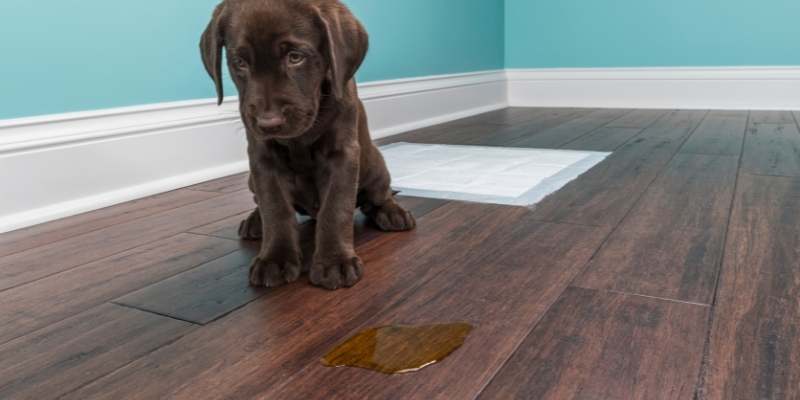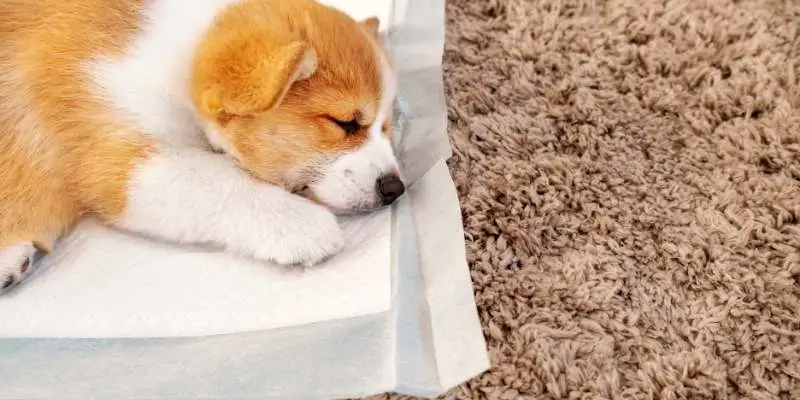When raising a dog, it is crucial to be mindful of its habits. Since dogs can’t communicate what they are feeling, you have to make some hard calls at times, depending on behavioral cues which can be relied on. For example, suppose you suddenly notice your puppy urinating more than usual. In that case, there is a reasonable extent to which it can be a matter of worry. However, when it comes to an understanding why is my puppy peeing so much, you must keep in mind that, on average, a dog pees every once in 4 to 6 hours.
However, old dogs and puppies tend to pee a little more than this. However, to ensure that your puppies’ frequent peeing doesn’t threaten them, there are some warning signs that you have to look for. To learn more, continue reading!
Do you have a specific question about the reasons why your puppy is peeing so much? Then use the table of contents below to jump to the most relevant section. And you can always go back by clicking on the black arrow in the right bottom corner of the page. Also, please note that some of the links in this article may be affiliate links. For more details, check the Disclosure section at the bottom of the page.
Here's what we'll cover:
Why does my puppy pee so much?
If you are wondering why is my puppy peeing so much, some reasons can be ascribed to it. In today’s fast-paced world, most dog owners don’t get to spend a lot of time with their little puppies. They spend most of the time outside the house and come back after a huge span. This means that your puppy doesn’t get much exercise unless you have the luxury of hiring a dog walker.

Exercise is actually brilliantly connected to the peeing behavior of dogs. Dogs need stimulation to pee, and without it, it can happen that they owe a lot only when stimulated while not relieving themselves at other times. This is especially true for a puppy since they still need to be potty trained. Suppose you’re noticing that your puppy pees every 10 minutes. In that case, it might also be because the potty training process needs to be completed for them to understand and agree upon the cues for peeing. Before jumping into medical reasons, these are some things you must consider, especially if you have adopted the puppy recently.
The concept of submissive and exciting peeing
Although peeing every two hours is considered normal in the case of puppies, your dog might be peeing more if they feel excited or submissive. Dogs feel submissive when they find themselves in a situation where they are in the presence of someone who is socially more dominant than them. It causes a fear response that leads to a biological response, often expressed in peeing.
There are ways to train your dog to stop submissive peeing. You must always remember that puppies are far more excitable and enthusiastic than older dogs. They are easily stimulated, and exciting peeing can often take place with a plethora of things around them. Suppose you’re suddenly observing and wondering, ‘my puppy pees a lot. In that case, it is pretty normal for puppies less than one-year-old. However, this problem goes away as they grow older.
Medical reasons for frequent urination in puppies

While in many cases, a puppy frequent urination might not be a reason to worry at all. But, sometimes, if you notice your puppy peeing a lot over an extended period, it might warrant medical attention. Medical aspects of frequent peeing in dogs are related to the following:
Diabetes
In many cases, excessive urination in puppies can be a signal. For diabetes, especially diabetes mellitus. Just like in humans, diabetes occurs when the body cannot process carbohydrates and sugars properly. This is a serious condition and warrants medical attention.
Urinary tract infection
UTI is commonly linked with a puppy suddenly peeing a lot. However, in most cases, UTI symptoms include more than just frequently peeing. Discomfort when peeing or even bloody urine are common symptoms that you might be on the lookout for if you suspect that your puppy has a UTI. However, it is a fairly treatable problem and should not warrant much stress or worry.
Overheating and lack of satiation
If you notice that your puppy pees every 15 minutes, it can often be because of overheating. If you live in a country that is rather warm and you do not have a cooling system at home, this can be the reason why your puppy is peeing so much. If this is the reason, you should also implement better strategies to ensure that your dog is drinking more water. Excessive peeing while not drinking enough water can be detrimental to your dog’s health. It is a widespread problem, but one that you will be able to solve relatively quickly.
Spinal cord injury
If your puppy has a form of spinal cord injury, it is likely to have an effect on their peeing and pooping. This can lead to lesions in the gastrointestinal tract or the urinary tract and needs to be treated with utmost care and attention.
What to do when the puppy is peeing frequently?

It is not easy to understand why a puppy pees so much without running some tests and visiting your veterinarian. Although you can make a reasonable guess at times, if it becomes a serious issue, you should not delay your visit to the doctor. For example, frequent urination in female puppies can indicate a urinary tract infection. Because UTIs are most common in female dogs and have a higher incidence rate in this population. However, when it comes to your puppy, there is hardly much room for speculation if this problem persists for a long time. However, clean the sight of the incident immediately because the smell of the pee can re-stimulate your puppy to pee again. You can watch this video to learn about medical problems associated with puppies constantly peeing.
If you are worried about why is my puppy peeing so much, it is always best to carefully observe their routine. Take your pup to a veterinarian as soon as you understand the problem for the best course of action.
Thanks for the blog graphics: Canva.com

Thanks for the blog graphics: Canva.com
Doghint.com is a participant of several affiliate programs. The list includes (but not limited to) the following: VigLink, Refersion, ShareASale, and Amazon Services LLC Associates Program, an affiliate advertising program designed to provide a mean for us to earn fees by linking to Amazon.com and affiliated sites. Doghint.com does not intend to provide veterinary advice. All published articles are meant for informational purposes only and not substitute the professional veterinary consultation.


